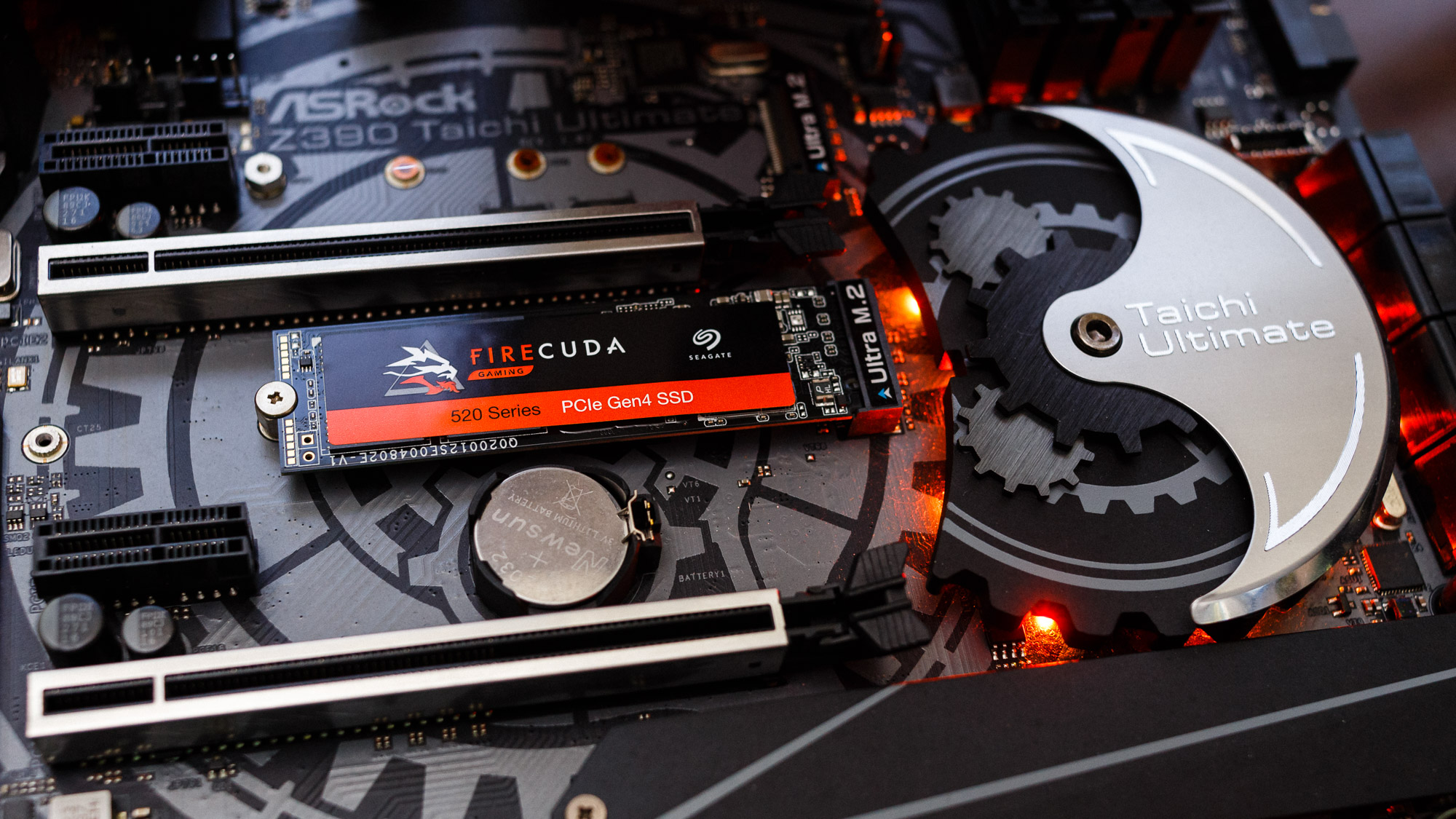Why you can trust Tom's Hardware
After years of barely having any interest in the consumer SSD market, Seagate now has a solid lineup of great performing SSDs. The Seagate FireCuda 520 is now one of the fastest SSDs you can get for your X570 platform, and it comes backed by a five-year warranty and one of the highest endurance ratings we've seen with a consumer drive.
With performance figures topping 5/4.4 GBps of sequential read/write throughput, PCIe Gen3 SSDs can’t touch it during pure sequential file transfers. The FireCuda 520 features a very large write cache, too, so most users won't ever push it into its slowest state. The drive is even quite competitive with Intel’s Optane SSD 905P, especially for the price. No matter what the workload, you will have a positive end-user experience with all the responsiveness you could ask for.

The FireCuda 520 even undercuts the Samsung 970 PRO’s pricing. However, while the FireCuda 520 one-ups those drives in the pricing department, similar SSDs from the competition are significantly cheaper. At 1TB, the FireCuda 520 costs $249.99, while the Corsair Force MP600 and Team Group Cardea Zero Z440 both cost just $189.99. Even Gigabyte’s Aorus NVMe Gen4 SSD is $40 less, and the Patriot Viper VP4100 is $30 cheaper at the time of writing. Not only that, these SSDs even come with heatsinks preinstalled, making them tough competition for this SSD.
However, if you want to use the FireCuda 520 with your motherboards' built-in M.2 heatsink or some sort of PCIe x16 M.2 adapter card, it might be one of the best options. Removing the heatsinks from most of competing SSDs could potentially result in damaging the drive – especially the Viper VP4100. However, a heatsink might not be necessary for the FireCuda because it didn't throttle one bit while transferring over 300GB of data with no airflow.
MORE: Best SSDs
MORE: How We Test HDDs And SSDs
MORE: All SSD Content
Get Tom's Hardware's best news and in-depth reviews, straight to your inbox.

Sean is a Contributing Editor at Tom’s Hardware US, covering storage hardware.
-
Makaveli "Phison’s stock 11.2 firmware"Reply
I own the Corsair MP600 drive and just updated to firmware 11.3 since this drive uses the same controller that firmware update maybe available aswell.
I saw a slight boost in performance going from 11.1 to 11.3 -
cryoburner Why is this drive being positioned as a "gaming" drive? Gaming systems don't typically need anywhere near that level of write endurance, and as far as game load times are concerned, this drive appears to perform more or less identical to the Intel 660p, a drive that costs half much for a given capacity.Reply -
Makaveli Replycryoburner said:Why is this drive being positioned as a "gaming" drive? Gaming systems don't typically need anywhere near that level of write endurance, and as far as game load times are concerned, this drive appears to perform more or less identical to the Intel 660p, a drive that costs half much for a given capacity.
Its just marketing and those people tend not to be technical in nature. Slap gaming and RGB on anythings these days and the kids go nuts. However going SSD to NVME to PCIe 4 NVME will do next to nothing for game loading times because majority of games are not limited by I/O.
As for the Intel 660p I would only choose that drive if you are on a limited budget. Its constantly at the bottom of the charts in this review and doesn't perform identical.
Also the 660p uses QLC memory and this drive is using 3D TLC memory.
Intel 660p 1TB PCIe 3.0 x4
Memory
QLCMTBF
1,600,000 hoursMax Sequential Read
1,800MB/sMax Sequential Write
1,800MB/s4K Random Read
150K4K Random Write
220K
vs
Seagate FireCuda 520 1TB PCIe 4.0 x4
Memory
3D TLCMTBF
1,800,000 hoursMax Sequential Read
5,000 MB/sMax Sequential Write
4,400 MB/s4K Random Read
760K4K Random Write
700 K -
bigdragon I'm surprised there isn't a bigger gap between PCIe 3 and 4. Seeing that 970 Pro keep up with this Firecuda 520 and MP600 makes me think that the new gen 4 drives are not yet ready.Reply -
Makaveli Just early controllers the next batch using newer controllers will make the gap bigger.Reply -
trumanhw ReplyAdmin said:Seagate's latest drive is fast, but expensive.
Seagate FireCuda 520 SSD Review: Big Performance in an Expensive Package : Read more
What...could...you...mean..?
This review is incoherent at best, and must be false in others.
QD1 Reads of 32KB files at a mere @ 1GB/s
QD1 Reads of 64KB files at a mere @ 2GB/s
If you give it 5 min it recovers 116GB of SLC
If you give it 30 min it recovers 100GB of SLC
So, at QD1
and sub 32KB, the 905P ... might ... keep up..?
NEVER is when it's ahead of the pack..?
Just one of the colors covered by
Samsung's consumer SSD And the crucial ...?
Of course I believe that.
Ignoring every 1GB/s I've always get (videos, using my 970 Evo+).
That reads at 2GB/s like .. almost all the never. What a great review. ?
I just hope everyone at Tom's keeps up the ... great work...?
<Mod Edit - Removed off topic political text>